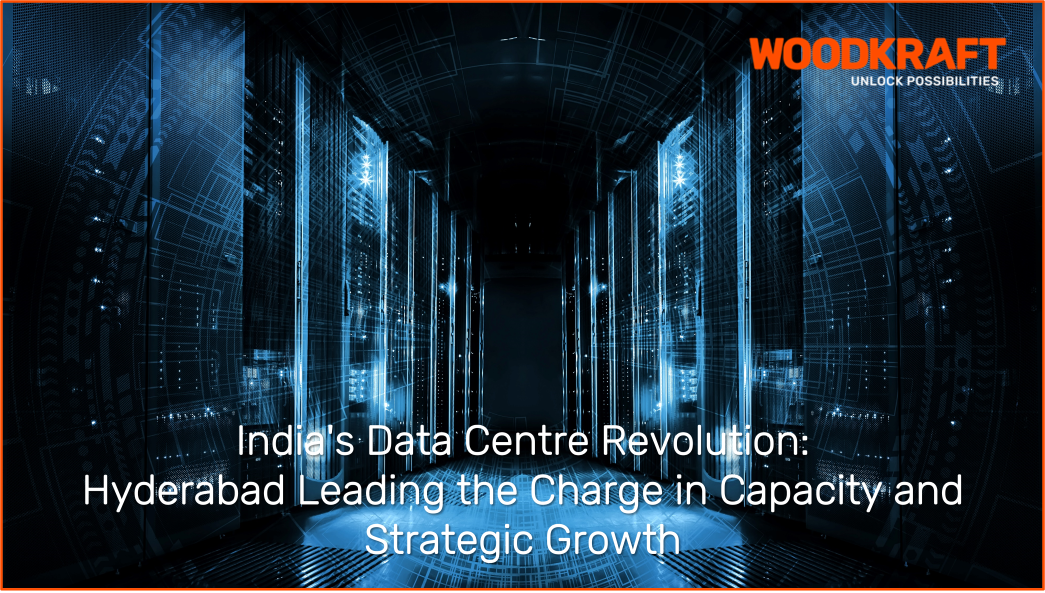DATA CENTRE
India's Data Centre Revolution: Hyderabad Leading the Charge in Capacity and Strategic Growth
July, 2024
India's data centre industry is on the brink of a remarkable transformation, with expectations of a twelvefold increase in capacity from 1-1.5 gigawatts to 17 gigawatts by 2030. This unprecedented growth is fuelled by substantial investments and strategic advancements across key markets, particularly in South India.
India's Data Centre
A Surge in Capacity and Investments
In the past three years, the Indian data centre sector has drawn investments exceeding $27 billion. Global giants like NTT, AWS, and Colt DCS, alongside Indian powerhouses such as Reliance and Adani, are making significant inroads into this burgeoning market. By 2030, data centres are anticipated to account for 6% of India's total power demand, up from less than 1% today. This projection reflects a compound annual growth rate (CAGR) of over 50%.
The surge in data centre activities gained momentum following the Reserve Bank of India's directives to localize payment-related data, which catalysed the sector's rapid expansion from 2021. Notably, the growth accelerated when HDFC and Mastercard faced temporary bans on issuing new cards due to data localization issues. Investments in power generation and transmission & distribution (T&D) are projected to rise 2.2 times to $280 billion from FY24 to FY30, compared to the previous period from FY17-23.
India's Data Centre
Hyderabad: A Key Player in South India’s Data Centre Market
Hyderabad has emerged as a pivotal player in South India's data centre landscape, alongside Chennai and Bangalore. The city is rapidly becoming a data centre hotspot, bolstered by government incentives, strategic infrastructure investments, and a surging demand for digital services. The combined installed data centre capacity in these cities is approximately 200 MW, with 190 MW under construction and 170 MW in the planning stages.
Hyderabad's growth is underpinned by proactive government policies and excellent connectivity. The city currently boasts an installed capacity of 47 MW, with an additional 58 MW planned. The demand for data centres in Hyderabad is further fuelled by the rise of 5G, the Internet of Things (IoT), and cloud services, which are driving digital transformation across various sectors.
India's Data Centre
Strategic Advantages and Future Prospects
Chennai, with its strategic coastal location and robust submarine cable connectivity, remains a leading data centre hub. The city currently has an installed capacity of 87 MW, with 156 MW under construction and 104 MW planned. Bangalore, known as the Silicon Valley of India, leverages its robust IT ecosystem and skilled workforce, boasting an installed capacity of 79 MW, 10 MW under construction, and 26 MW planned.
These cities offer unique advantages that make them attractive destinations for data centre investments, including favourable climates, robust power infrastructures, and strategic government policies. The data centre market in South India is projected to grow by 65% by 2030, underscoring the region's crucial role in supporting global digital infrastructure.
Hyderabad Leading the Charge in Capacity and Strategic Growth
Conclusion
India's data centre industry is poised for exponential growth, driven by significant investments and strategic developments. Hyderabad, alongside Chennai and Bangalore, is at the forefront of this transformation, presenting a promising future for data centre investments and digital infrastructure development. As the demand for digital services continues to soar, India's data centre capacity is set to surge, positioning the country as a key player in the global data centre market.
India's Data Centre
Stay inspired, stay informed, and stay connected with Woodkraft.
Follow Woodkraft on LinkedIn for the latest updates and inspiring workspace solutions.






